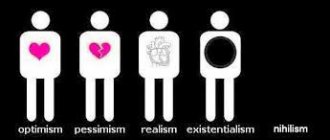From the very first moments of birth, a tiny creature that comes into this world is bombarded with a huge flow of information. And the little man perceives it with all his senses. After some time, the little subject learns to systematize the information received, which forms his first impressions of the environment. But an entire life would not be enough for the emerging consciousness to experience the vast world alone. Therefore, the baby soon begins to communicate with other people, learning to perceive the information they have accumulated, listening to their conversations and receiving advice. And only after many years does the grown-up subject begin to form his own opinion about his surroundings. This serves as proof that he is developing as a person.
Stages of cognition
Who should a child listen to if not his own parents? Moreover, as a rule, they always want only the best for their beloved children. But it happens that the opinion of even the closest people is not just expressed to a growing son or daughter, but is imposed. In some cases, this happens in a veiled manner, but it can also take the form of outright dictate.
Not all parents want to understand that the child has the right to his own opinion. But even without perceiving him as a person, his loved ones do not want harm. They simply believe that they know better what to do in this or that case.
A child’s worldview is a fickle thing. It most often changes over time under the influence of accumulated experience. This, in fact, reflects the stages of cognition of the surrounding world.
Do you need to defend your opinion?
A person who does not know how to defend his point of view risks living someone else’s life. Unfortunately, sometimes it happens that a child, accustomed to obeying his elders in everything, carries this attitude into his adult life. At first, the young man gives in to older people, considering them more experienced and authoritative. Then his peers gain their authority, and he begins to obey them. Over time, a person has nothing left of his own, something that he would defend, no matter what.
Sometimes people begin to lose the ability to defend their position gradually. It is enough for a person to agree once with a more authoritative or stronger opponent, and he loses a part of himself. Especially if the subject of the dispute was of fundamental importance to him. Next time it becomes more difficult for him to start an argument and much easier to agree with someone else's opinion. As a result, a person loses his own “I” and constantly follows the lead of others.
Learn from your own mistakes
Many young people are sure: doing everything according to the rules is a guarantee that nothing bad will ever happen to you. However, life destroys their stereotypes. Others, on the contrary, try to act in defiance of everything, seeking the right to do as they see fit. They smash dogmas and ridicule established truths. Sometimes this promotes progress, but often ends in tragedy.
You have to pay for mistakes and sometimes – extremely cruelly. By imposing their own opinions on children, parents want to protect them from disappointment and pain. But one thing they don’t want to understand is that life experience is often formed precisely from mistakes. Otherwise, their child will never succeed as a person.
What should you not forget when defending your point of view?
There is no need to defend your opinion with vehemence or aggressiveness.
The English writer and diplomat F. Chesterfield, who knew a lot about disputes and negotiations, rightly noted: “Never prove your own opinion loudly and passionately, even if in your soul you are convinced that you are right - express it modestly and calmly, for this is the only way to convince."
Aggressiveness, shouting, and scandalous imposition of one’s opinion usually end in a break in the relationship. Moreover, “when passions run high, truth evaporates.” And the British writer Carlyle rightly noted: “As soon as we feel anger during an argument, we no longer argue for the truth, but for ourselves.”
Dependence on other people's opinions
You have to listen to the opinions of others, because human life is too short, and the experience of ancestors and contemporaries is simply necessary to do something worthwhile in your lifetime. You can't judge everything for yourself. However, should every opinion be listened to, and does every piece of advice contain valuable information? If parents, sharing their opinions and wanting only the best, are mistaken, then there are often people who give advice from bad intentions.
Some listen only to the opinions of authoritative, proven mentors. But there are also those for whom any sideways glance, caustic remark, or offensive remark is already a tragedy. Those representatives of the human race who are able to react adequately and soberly to this, without moral vacillation and internal torment, can already consider themselves self-sufficient and independent people. Therefore, when others slander you, you can give only one piece of advice: have your own opinion.
The importance of speaking your mind
It is emotionally easier to adapt to a group than to express an opinion that contradicts the majority. However, if we all behaved like a flock of sheep who only follow others, we would likely contribute to the consolidation of totalitarianism and there would be no collective progress.
Researcher Charlan Nemeth of the University of California, Berkeley, showed that jury verdicts were much fairer when one juror disagreed with the majority. These disagreements usually prompt a reexamination of the facts and circumstances. When someone questions the majority opinion, those who agree with him feel the need to collect more evidence to prove their point. And this is a positive thing.
Therefore, speaking your mind is very important. You must be true to yourself. You may be wrong, but it doesn't matter. The most important thing is to allow your conscience to guide you and regain the right to think differently.
As a social species, it is important to learn to listen to those who think differently and focus on the most compelling arguments, regardless of how many people agree or disagree with you.
- Do your thoughts belong to you, or to someone else?
Should you follow the crowd?
Most representatives of the human race find it easier to perceive what is generally accepted, proven, and popular than to find their own answers to questions that arise in life. In order not to appear stupid, not to become an object of censure in society and criticism of others, people hide their true feelings and do not give way to secret thoughts. They do not dare to openly express their own opinions. But if you constantly silence your inner self, how can you bring your ideas into the world and leave a mark on this Universe?
In addition, if from birth you do not live with your own mind, then this contributes to the development of indecision and self-doubt. And all this serves as a signal for the “vultures” of this world to attack. After all, the weaklings in the herd of “predators” are usually “eaten” first.
Is the truth always born in a dispute?
Many of us are familiar with the expression “Truth is born in dispute.” That is, in the process of a dispute, people exchange opinions, supported by arguments, and find out the truth, which is the goal of any dispute. This expression is attributed to the ancient Greek philosopher Socrates.
But it turns out that Socrates looked deeper: he said that in a dispute everyone tries to prove that he is right, to defend his point of view. But since human knowledge is imperfect, rightness is a relative concept. He himself loved to communicate with people and from everyone he received the necessary knowledge that brought him closer to the truth. This allowed him to solve various problems without arousing aggression, resentment and hatred in people. After all, in a dispute it is important not only to prove the correctness of your opinion, but also to enrich yourself with knowledge of your opponent. Therefore, Socrates believed that it is not an argument, but a dialogue - and with a person, and not a crowd - that helps to form and defend the correct opinion.
That is, truth is not born in a dispute, since those arguing do not listen to their opponent, but at this time are thinking about their answer. They are preconceived to believe that they are right and everyone else is wrong.
As one of the greats rightly noted: “Dispute is the best way to bury alive the Beautiful Lady - Truth.”
Constant self-education
Forming your own opinion is not something that ends at a certain point and then miraculously freezes in place. This process, like our lives, is in constant motion. Moreover, it can be called a cognitive tool. And education is his food. But learning in itself is nothing without constant self-improvement.
Personal opinion can be formed from facts heard and read somewhere. But it’s much better if all this is confirmed by your own experience. It is better to test the knowledge accumulated by others in practice. And then the questions about whose advice should be listened to will disappear by themselves.
Is your opinion really correct?
The most important question is: is your opinion really correct? After all, it can turn out very stupid and even terrible if, in addition to the fact that you shove your opinion everywhere, it is also always wrong. There is a big difference between a true opinion or knowledge and what you think is true. The difference is that one is actually true and the other is not. If a person simply thinks that he is right, but cannot offer arguments more serious than “I think so,” “it seems to me,” “this is my opinion,” then this opinion is worthless. Especially if no one asked about him. Perhaps this is precisely the reason why they don’t ask you, because they know about the level of erudition and argumentation, but you persistently climb and climb. Of course, there will be a backlash and strong immunity to everything you say.
Influence others
When a person does not have his own opinion, he already gives others a reason to manipulate himself. Desires, dreams and impulses remain unfulfilled. Life passes, and looking back on the path traveled, a person is able to see only missed opportunities. For those around him, such a subject remains nothing more than an empty place. No one will take such personalities seriously.
Personal opinion is simply necessary to be aware of yourself and your place in society, even to simply remain human. Such people begin to do what others are actually unable to do. People follow bright personalities, look up to them and try to be like them. If something unique, strictly individual—his own “I”—does not exist in a person, then, in essence, it turns out that he has no reason to live.
What you need to be able to do to defend your opinion
Master the art of communication
They say that in a dispute, the winner most often is not the person who is right, but the one who knows how to argue - conduct a dialogue, that is, masters the art of communication and eloquence. At first glance, there is nothing complicated here, but if we try to find people in our environment who would serve as an example of calm and reasonable communication, then it is unlikely that there will be many of them. By the way, the heroes of modern TV series cannot serve as an example, most of whom, defending their opinions, shout hysterically in two or three voices and do not hear each other.
The art of communication includes the ability to manage a conflict situation, the ability to adapt to the interlocutor, oratory skills, and mastery of voice, facial expressions and gestures. And this art must be learned.
Use argumentation techniques
The technique of classical rhetoric is suitable for an overly aggressive opponent. The interlocutor is listened to carefully with an expression showing agreement with his point of view, and then his evidence is refuted with one strong argument. Accept positive responses. The conversation is structured in such a way that the interlocutor says “yes” to all our first questions. In the future, answering more significant questions, by inertia it will be easier for him to agree with our opinion.
Salami reception. The opponent is gradually led to obtain consent from him on the main issue, and only then on specific issues necessary to obtain full consent. Acceptance of refacing. The opponent is gradually led to opposite conclusions.
Mentally put yourself in the place of your interlocutor
We believe that he is wrong, but he himself is confident that he is right. When we identify the reasons why he thinks one way and not another, it will be easier for us to convince him and defend our own opinion.
Do not show offense or get irritated if they do not understand us and do not accept our opinion
Often in these cases, the opponents are close relatives who have had negative experiences in the past and now want to “spread straw” for their children and grandchildren so that they don’t get hurt. And only our confidence in our own rightness and examples of our successes will help to convince them.
Step No. 1: connect argumentation
When you defend your opinion in a dialogue, it is very important to focus on something reasoned, something that will be strong evidence of your judgment.
Now you can protest and say that there is such an expression: “How many people, so many opinions,” and we will agree with you, only with a small remark - sometimes people misinterpret well-known facts, and when defending their opinion, they simply get into trouble.
And our task is to prevent you from being in an awkward position.
I remember one dialogue when a man, positioning himself as an expert in medical matters, almost foaming at the mouth, argued that declaring brain death does not mean that a person cannot be resuscitated and returned to a full life.
Although the facts indicate the opposite: a person with such a diagnosis is actually a living corpse, since life is supported artificially, and as soon as he is disconnected from life support devices, there will be a fatal outcome.
The example, to put it mildly, is not encouraging, but it shows in the best possible way: gaps in some issue misinform the person himself, and in the eyes of others he will not look in the best light.
Argumentation is:
- your ally
- your support
- your support
Often people “drown” under the pressure of others. At this moment, they seem to be alone, they have nothing to rely on, and it turns out that it is easier to give up and take a step back than to defend their opinion. That is why we assigned the role of a supporting basis to argumentation. It is she who will give confidence and help resist the onslaught of her counterpart.
Dependence on other people's opinions
Why do we depend on the opinions of others?
Childhood is a golden time; spontaneous and sincere self-expression brings joy and attention to others. “Be yourself and don’t be afraid of anything!” adults tell their children, wanting to maximally support their freedom of expression. But there is also another parental message that forms attitudes that do not allow the child to behave naturally. The parent, due to his own limitations, constantly experiences irritation and fear when the child behaves differently from others. Parental remarks “Don’t yell,” “How dare you say that,” “What will people think” make the child withdrawn, therefore, in order not to lose the love of relatives, children refuse the opportunity to behave naturally.
Another option is overprotection, which does not give freedom to the child and tries to make him “ideal.” Overprotection manifests itself in words that, at first glance, do not mean anything bad: “Wear this dress, it will be better,” “Don’t run, you’re a good boy,” “This suits you better.”
The child loses contact with himself in both cases, he has thoughts that affect decision-making. The person who happens to be nearby offers a ready-made option, which the child cannot refuse, because the parents know what is “right.” And when it comes to pressure and suggestion from a parent, it is difficult for children to defend the right to their own opinion.
For such children, nothing changes during adolescence. Parents, through threats and “imposition,” lead the child along the “right” path; this path excludes gaining experience, thanks to which a person grows up and learns to take responsibility for his life.
When raising a child, you need to teach your child to listen to himself, develop sensory cognition and awareness at every age. During adolescence, children are most susceptible to the influence of public opinion, so it is important for the parent to direct the teenager’s attention to the internal dialogue: “What do you think about this situation?”, “What would you do here?”, “I like your vision of this issue.” If a child has his own vision, then you need to try to realize it.
Bonus step: humor
We did not include “humor” in the main steps, because, let’s be honest, “connected” humor is not always appropriate. And again, to use this bonus, the main thing you need is a sense of humor. It is a bonus because it can be used in certain situations. When, it will serve as a “switch” from one topic to another, a kind of castling.
When we have discussed the main steps, it is important to pay attention to the key components in the form of pitfalls and mistakes that people make in defending their point of view. And also highlight those tips that will become your trump cards.
Underwater rocks
We are talking about your deep-seated problems that need to be worked out in parallel. As a rule, when a person begins to give up and is unable to defend his point of view, this may indicate that:
- he is not confident in himself;
- significant people laid down the script that it is better to remain silent than to look stupid in the eyes of others;
- significant people often devalued what was said, on the basis of which a clear conviction was formed: my opinion is often wrong;
- the person is not sufficiently savvy on the issue and begins to “float” under the onslaught of arguments;
- For an individual, there are authoritative people whose opinions are law. As soon as such a person expresses the opposite point of view, he, under the weight of his opponent’s authority, gives up;
- aggression - as a psychological defense mechanism. This means that when a person is not sure about something, but does not want to show it and admit a mistake, he begins to be aggressive. And instead of “defending your opinion,” it turns out to be something like an “attack.”
Tips on how to properly defend your opinion
- Do not take any point of view as one hundred percent truth and only the truth. Someone else’s opinion is just someone else’s opinion, not supported by facts, and even if the person in your eyes is very wise and authoritative, his opinion is not the ultimate truth. An authoritative person came to this opinion through his own actions and mistakes, being in a different environment from yours.
- When arguing, try to trust your feelings and look carefully at the person, because in order to defend your point of view, you need to understand your opponent at least a little. Try to understand what his ideals are, what interests him, what kind of personality he is. Try to discern its advantages and disadvantages. By understanding a person, it will be easier for you to communicate with him, you will be on the same level with him.
- Ask your opponent why he thinks this way? How did he come to this conclusion? This comes from what was said earlier: every person's experience is obtained under different circumstances and in different environments. Knowing why a person came to a certain understanding of the situation, you will be able to explain the situation to him from your point of view, as if contrasting it. Well, besides, by showing interest in a person, you win him over.
- Manipulation. Do not try to manipulate - because this is simply dishonest and does not allow your opponent to express his point of view along with you. But if you feel that you have become a victim of manipulation, stop it immediately. No one has the right to start judging you, testing your nervous system for strength. If you allow yourself to be manipulated, you allow yourself and your self-esteem to be crushed.
- When expressing your point of view, be proactive, confident and specific. Don't engage in idle talk: someone's point of view is better understood when it is presented clearly, specifically and confidently. Be emotional, but in moderation: remember that you should never get angry or raise your tone. Take the argument as a test of your own personality: play with yourself, can you correctly tell the world about your opinion? How persuasive are you? If you fail, don't think of it as humiliation. Just promise yourself that next time everything will work out.
HOW TO DEFEND YOUR OPINION – Adam Galinsky – TED in Russian
Often, because a person cannot resist the opinion of others, he radically changes his destiny: he lives with a person he does not love, goes to a job he does not like, and a brilliant invention gathers dust in the closet. But life is given to a person only once, when, if not now, check and believe in the viability of your decision!










